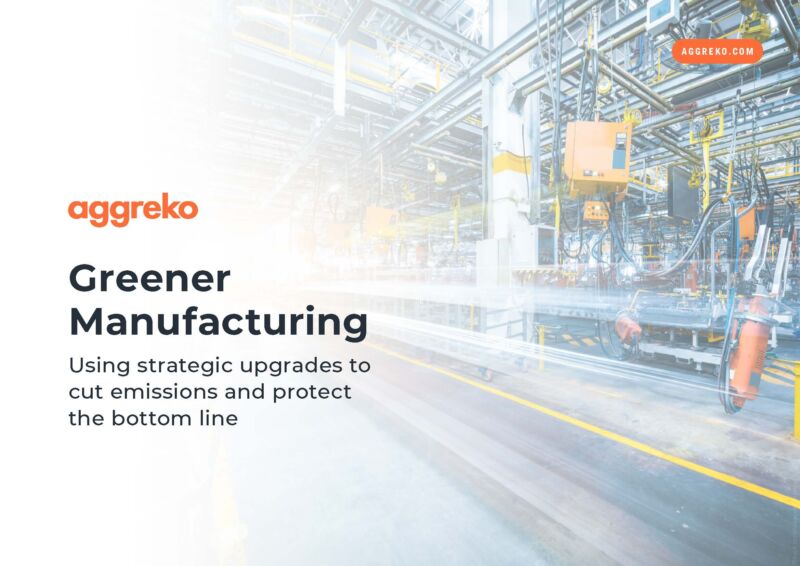Issues surrounding managing energy use, in light of both rising costs and sustainability targets, is dominating discourse in a number of industries. This perfect storm of factors means industry is looking for new ways of thinking when approaching energy usage. Following from this, in a recent report, the world’s leading energy authority IEA have claimed the energy crisis has strengthened the economic arguments in favour of cost-competitive, cleaner technologies.
Rising energy costs are ultimately compelling organisations to examine their current practices and explore solutions to meet ongoing challenges. However, while considering alternative approaches to overcome short-term troubles, stakeholders must also consider the increasingly unpredictable markets to procure effectively.
Areas for improvement
The UK’s wider economic challenges, has prompted managers across industry to protect their bottom-lines and review capital expenditure plans. Aggreko’s recent Greener Manufacturing report highlighted that industrial facilities are too often relying on power and temperature control systems oversized or poorly matched for their chosen application which can prove inefficient. This prompts a serious challenge for industry, as while businesses are facing increasing pressures to reduce costs and make incremental savings where possible, inefficient existing equipment is hitting their back-pockets.
A recent report from Make UK, a leading trade organisation, found that optimising energy efficiency is the main focus of decarbonisation for 74% of manufacturers. This illustrates the importance rising costs of energy have had in influencing businesses to adopt greener equipment upgrades which also protect their competitive edge. It’s clear that across industry, escalating energy prices requires innovative approaches across industry.
Working with volatility
Addressing unnecessary energy expense often requires access to efficient technologies that can be integrated into existing operations. However, while industry clamours for cleaner and greener solutions to deal with short-term difficulties, businesses must incorporate long-term thinking into their strategies.
Yet while current energy crisis has prompted a focus on the short-term across British industry, organisations increasingly need to incorporate volatile sector realities into their long-term plans. This poses questions of whether established procurement practices are suited to new market challenges.
While businesses have often adopted permanent equipment solutions, these can leave organisations at the whim of changing demand. Inability to scale provision up or down in markets where varying demand is becoming the norm means businesses could potentially find themselves stuck with over or underspecified and costly equipment infrastructure that cannot provide the dynamism required to efficiently cope with such rapid shifts.
The sustainability targets set out at the 2021 COP26 conference continue to inform companies’ decisions when it comes to updating equipment with greener alternatives. However, the unpredictable regulatory framework surrounding sustainable technologies pose the question of whether it is wise to permanently install technologies today, without certainty it will be compliant with increasingly rigorous sustainability legislation tomorrow.
Moreover, continuing uncertainty in the market is affecting firms’ ability to predict energy usage, causing further questions of the rationale behind committing to permanent installations. Updating fleets in this manner is therefore not only proving difficult for companies working within tight margins, but could also trigger difficulties later on when greener, higher-performing technologies become available, due to a lack of budget.

Flexible energy solutions
Organisations across industry ultimately face a serious procurement dilemma, as while addressing excessive energy usage requires immediate action, unpredictable markets and tightening regulatory frameworks can lead to uncertainty in purchasing strategies. Moreover, while the energy transition will be at the fore of industry for years to come, the resulting technology updates can hamper business’ ability to comprehensively plan for the future.
Permanent equipment procurement may therefore not be suited to a continually unpredictable technological, industrial, and economic landscape. In light of this, temporary procurement strategies offer an innovative approach for industry tonavigate the transition to sustainable energy while protecting all-important bottom lines. Through these equipment measures, significant efficiency improvements can be achieved without impacting capex budgets at a time when financial margins are increasingly strained.
By adopting a flexible energy model, businesses will not be restrained by permanent equipment holdings, and power can be scaled up or down – an important advantage in today’s uncertain trading conditions. Specifically, hired energy and temperature control solutions can help existing facility infrastructure adapt to an increasingly unstable grid and unpredictable market, enabling more pragmatic and proactive strategies.
This approach, however, relies on suppliers with high-performing fleets to assist industry-wide adoption of greener and more cost-effective production. By possessing necessary expertise and up-to-date technologies, suppliers can support businesses’ ability to manoeuvre to mitigate the current energy crisis and adapt operations to mee continual industry change.
Aggreko’s Greener Manufacturing Upgrades, for example, sets an example to industry by demonstrating how efficient temporary generator equipment and other practices can cut emissions and fuel consumption without sacrificing output. For instance, by investing in more sustainable products and offering customers cleaner technologies and alternative fuels such as Hydrotreated Vegetable Oil (HVO) organisations can move toward a more low-carbon future without a loss in performance.
Temporary measures, permanent solutions
As industry looks to reduce emissions and maintain their competitive edge, inefficiencies as a result of ill-suited, insufficient, or poorly performing equipment can prove prohibitive. However, with suppliers capable of matching the right package with the right process, companies can bypass these issues while scaling production capabilities in line with continually changing demand.
A temporary procurement approach places manufacturers on a firm footing to take on immediate industry challenges, while addressing long-term industry trends and uncertain market forces. Working closely with solution suppliers can also help energy professionals further improve business robustness while also adopting more sustainable practice. Ultimately, rather than viewing sustainability measures as a barrier to competitiveness, by adopting a flexible energy approach, businesses can thrive during the wave of decarbonisation.
Click here to download the full Greener Manufacturing guide.





